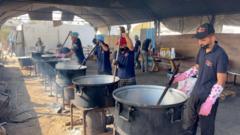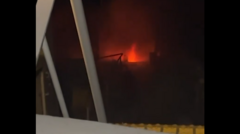Thousands of Israeli reservists are demanding an end to the Gaza war, highlighting a split within the military and society over the ongoing conflict. Their calls emphasize interest in securing the release of hostages over military objectives, indicating a shift in public sentiment and military morale.
Rising Dissent Among Israeli Reservists Fuels Calls for Ceasefire in Gaza War

Rising Dissent Among Israeli Reservists Fuels Calls for Ceasefire in Gaza War
As Israeli reservists voice opposition to continued military action in Gaza, Prime Minister Netanyahu faces intensified pressure to negotiate hostage resolutions.
Israel is currently facing a growing wave of dissent among its reservists regarding the ongoing war in Gaza. Prominent military figures and thousands of reservists are urging Prime Minister Benjamin Netanyahu's government to cease hostilities and focus on negotiations to secure the release of the 59 hostages still held by Hamas. Initially, support for military action against Hamas was strong; however, the prolonged conflict has shifted opinions, leading to calls for a reevaluation of priorities.
Former Mossad head Danny Yatom has vocalized concerns about Netanyahu prioritizing political stability over the well-being of the hostages, remarking that "Israel is going to a very bad place." He, like many others, stresses the urgent need for a national response to what they perceive as misguided military strategy.
The trend of reservists mobilizing to protest this stance marks a significant turnaround from the response to the 7 October 2023 Hamas attack that spurred the current offensive. While hundreds of thousands enlisted to serve, current reports indicate a concerning drop in participation, with reserve attendance plummeting to as low as 50-60%. This poses a critical challenge for the Israeli military, which relies heavily on reservist personnel.
In a significant display of dissent, open letters signed by reservists from diverse military branches have emerged, with one letter from air force reservists highlighting that the ongoing conflict endangers hostages' lives. The military community's burgeoning discontent resonates with a wider public that increasingly supports negotiations to avert further loss of life.
The Israeli public's sentiment appears to be shifting alongside these developments, underscored by recent polls suggesting widespread support for a new ceasefire and hostage release negotiations. Amid mass protests, images of both the hostages and Palestinian casualties highlight an escalating call for accountability and a reassessment of military ethics.
Prime Minister Netanyahu faced backlash for his remarks dismissing these protests, but the growing unrest within military ranks and society signals an urgent need for dialogue over warfare. Calls for disobedience among military leaders underscore the concerns that the ongoing conflict may compromise Israel's moral standing and lead to severe international scrutiny.
With dissent growing, Israeli society stands at a critical juncture, contemplating the implications of its military strategy and the resultant humanitarian crisis as military operations in Gaza continue.


















